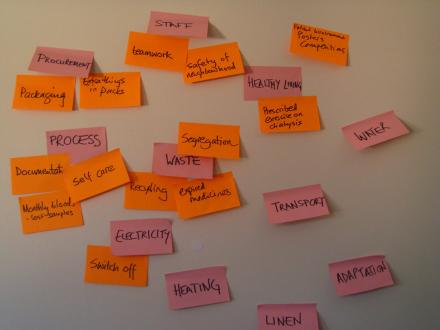Workshops
SAP uses two facilitated workshops to help staff learn about sustainable healthcare, identify their priorities and draw up an action plan. Both workshops are designed to run over two hours.
SAP Workshop 1: "Where to start?"
Summary: Workshop 1 provides an introduction to sustainable healthcare, gives examples of environmental issues and waste in the NHS and of actions taken by other units. The team then debates its priorities and reaches agreement on which issue(s) to tackle first.
Workshop goal: team agreement on issue(s) to tackle in Workshop 2.
 It is vital that the team decides for itself which issues to address. The pre-questionnaire will help to get people thinking about their top issues before the programme starts. This information can be used (together with the facilitator notes and slides) to plan the first workshop to be as relevant as possible.
It is vital that the team decides for itself which issues to address. The pre-questionnaire will help to get people thinking about their top issues before the programme starts. This information can be used (together with the facilitator notes and slides) to plan the first workshop to be as relevant as possible.
Agreeing priorities:
It is best to agree just one or two areas to work on at this stage – the team can always take on new ones in future. Think about:
- Which issues have the biggest consequences for the environment (and health)?
- Which issues can your team realistically make a difference to?
Do people want to start with something simple that can be tackled relatively easily, or something more complex, but which may have a bigger impact? Make a list of issues that you have put aside for later.
Download facilitator notes for Workshop 1
Download slides for Workshop 1
Download pre-questionnaire
SAP Workshop 2: "Action Planning!"
Summary: Workshop 2 explores in detail the issue(s) chosen by the team in Workshop 1. The team draws up an action plan with clear, specific objectives, and agrees how to manage implementation.
Workshop goals: a sustainable action plan, and agreement on managing implementation.
Exploring your issues:
This takes time, so if more than one issue has been chosen, it may be best to split into groups and tackle them individually. Does the team have the all the necessary knowledge to explore the problem? If not, it may be worth some fact-finding before the session, or inviting a relevant guest to join on the day.
The group starts by describing or drawing out how the process works today. They identify the barriers or waste points and try to understand the roots of the problem (see Tool 11 ‘From Cause to Effect’) - this will help to show what changes are needed. Proposed actions are fed back to the rest of the team.
Drawing up your action plan:
- Decide objective(s)
- Set a KPI (“Key Performance Indicator”) – what you will measure.
- Each action point should identify the resources required – time and money.
- Each action needs a named responsible person, and a timeframe.
Download facilitator notes for Workshop 2
Download slides for Workshop 2
Download Evaluation Form 1
